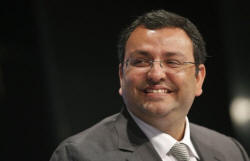|
India's Tata group
accuses ousted chairman of malice
 Send a link to a friend
Send a link to a friend
 [October 27, 2016]
By Aditi Shah and Promit Mukherjee [October 27, 2016]
By Aditi Shah and Promit Mukherjee
NEW
DELHI/MUMBAI (Reuters) - Tata Sons accused its former chairman, Cyrus
Mistry, of leveling unsubstantiated claims and malicious allegations
against the Indian conglomerate as the bitter and highly public row over
his sacking escalated on Thursday.
The acrimonious exchange has led aides to Prime Minister Narendra Modi
to urge restraint in a dispute that could sully the reputation of one of
India's oldest and most respected business houses. Tata Sons has had
only six chairmen since it was founded in 1868, growing into a $103
billion international conglomerate that today spans cars, steel and
information technology.
Mistry's parting shot, in a blistering letter penned after he was ousted
in a boardroom coup on Monday, accused the company of failures of
governance that he said had destroyed billions of dollars in shareholder
value.
He also alleged inappropriate interference by Ratan Tata, the
78-year-old patriarch who hired him and has come out of retirement to
run the business in a caretaker role.
Tata, in its eight-paragraph statement, dismissed the claims of the
48-year-old Mistry out of hand.

"The correspondence makes unsubstantiated claims and malicious
allegations," Tata Sons said in the statement emailed to journalists a
day after Mistry's five-page letter was leaked to the press.
"These will be responded to in an appropriate manner," the company said
without elaborating, raising the prospect that the war of words could
lead to a legal battle.
The country's two largest stock exchanges demanded clarity from Tata's
more than two dozen listed units in what could herald scrutiny over why
investors were not told of Mistry's concerns earlier.
At least one unit, Tata Steel <TISC.NS>, dismissed talk of writedowns.
But shares in all the group's major listed companies fell on Thursday.
Public confrontations of this nature are rare in Indian corporate life,
particularly when they involve established conglomerates and business
elders like Ratan Tata, who ran the Tata group for over two decades
before hand-picking Mistry.
"It has taken everyone by surprise. Nobody would have thought such
things could happen at Tata," said J. N. Gupta, a former executive at
India's markets regulator and now managing director at Stakeholders
Empowerment Services.
Nalin Kohli, a national spokesman of Modi's Bharatiya Janata Party and a
Supreme Court lawyer, said: "The larger question will remain whether a
legal battle will serve the interests of shareholders."
CULTURE CLASH
Inside Tata, a company that promotes its roots in the heritage and
social values of the Parsi community, some workers have bristled at the
board's treatment of Mistry. But executives also questioned Mistry's
efforts to restructure the group.
"It is like a bunch of finance or hedge fund guys that have walked in
and decided to cut everything. This is not the Tata way of doing
business," said one source close to the Tata group in response to the
letter.
"If you are picking things that are not working and then trying to get
rid of them, where is growth going to come from?"
Ratan Tata was an acquirer in his time at the top, overseeing deals like
the $12 billion acquisition of Corus, formerly British Steel, in 2007,
and the purchase of Jaguar Land Rover a year later.
[to top of second column] |

Cyrus Mistry, chairman of Tata Group, smiles during the Tata
Consultancy Services Ltd. (TCS) annual general meeting in Mumbai
June 27, 2014. REUTERS/Stringer

Mistry
accused the board of failing to give him "room to move", and argued that Ratan
Tata had acted as an alternative power center, in particular driving deals that
created two airline businesses.
Its Tata Motors arm extended credit too easily to fuel sales, Mistry said, and
when fraudulent dealings surfaced at AirAsia India, they were not acted on fast
enough.
In its rejoinder, Tata stated that Mistry, who was appointed a director in 2006
and made executive chairman in 2012, would have been "fully empowered" to lead
the group and its companies.
"He would be fully familiar with the culture, ethos, governance structure,
financial and operational imperatives of the Tata Group as well as various group
companies," the company said.
"It is
unfortunate that it is only on his removal that allegations and
misrepresentation of facts are being made," it added. "The record, as and when
made public, will prove things to the contrary."
One lawyer said Mistry's letter appeared to be presenting arguments that both he
and the interests of the company had been the victim of "oppression and
mismanagement" as cited in India's Companies Act, 2013.
"It would not be unprecedented for a managing director or chairperson to
proclaim oppression - even if he was in charge," said the lawyer Amir Singh
Pasrich, managing partner of I.L.A. Pasrich and Co, a New Delhi-based law firm.
He is not advising either side.
Mistry
remains a director of Tata Sons and could by law only be removed by shareholders
after being given due warning. He also chairs several listed units and his
Pallonji family owns nearly a fifth of Tata Sons.

Abhishek Manu Singhvi, a senior lawmaker from the opposition Congress party and
lawyer who has been retained by Tata, dismissed Mistry's allegations and
questioned his motivation in going public with them.
"I don't see any reason to have allegations and counter allegations," Singhvi
told Reuters Television, adding that the "maligning and bad mouthing should
stop".
(Additional reporting by Douglas Busvine, Rupam Jain and Sunil Kataria in New
Delhi, Abhirup Roy and Euan Rocha in Mumbai; Editing by Clara Ferreira Marques,
Douglas Busvine and Raju Gopalakrishnan)
[© 2016 Thomson Reuters. All rights
reserved.] Copyright 2016 Reuters. All rights reserved. This material may not be published,
broadcast, rewritten or redistributed. |